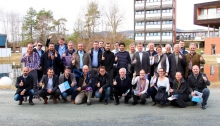
The benchmarking tour took place in framework of the SECURECHAIN project implementation and was aimed at sharing experience of Austrian regions, companies and NGOs as well as project partner – BOKU, on the energy efficiency and energy production from wooden biomass.
Duration of the study tour was from 8th to 10th of March and consisted of the introductory project session in BOKU with presentation of partner organizations and project pilot regions (see the map below) followed by a world café part, aimed at getting to know each other and discussing fields of activities and questions of common interest.
SECURECHAIN project consortium consists of 10 organisations based in Austria, The Netherlands, Sweden, United Kingdom, Spain, Greece and Estonia. The team unites excellent competence in biomass, bioenergy, energy efficiency, supply chain management, cluster management, sustainability, certification and green investment. The consortium is coordinated by the BTG Biomass Technology Group, Enschede, The Netherlands.
SECURECHAIN targets six representative model regions, covering a range of market situations and technical-socio-economic barriers in the sector. They include ‘pioneer’ regions in bioenergy supply chains connecting to emerging ‘follower’ regions with lower technological standard and development. The regions are valuable European testbeds for supply chain management in bioenergy and ensure a broad relevance of outcomes.
During the study tour there were representatives of all 6 model regions of the project, namely: NRW – North Rhine-Westphalia, Germany and Overijssel and Gelderland, The Netherlands, Småland, Sweden, Catalonia, Spain, Western Macedonia, Greece, Southern Estonia, Estonia, represented by 24 participants.
The study tour, generally, could be divided into three types of visits/meetings:
A)Presentations of the model regions Hartberg, http://www.klimaundenergiemodellregionen.at/start.asp?ID=242792 and Gussing, http://www.gussingrenewable.com/ with federal financial support to energy strategies and energy improvement activities;
B)Visits to the CHPs of different scales (Vienna energy plant (not visited personally but in the program), Green Power GmbH in Pöllau, wood‐gasifier CHP with 180 kWel und 320 kWth, http://www.urbas.at/referenzen.asp?active_page_id=387&parent_page_id=382&pparent_page_id=262, Bioenergie Grabner KG in Schachen, wood‐gasifier CHP 50 with 4x50 kWel und 400 KWth, http://www.froeling.com/en/products/waerme‐und‐strom/neu‐holzverstromungsanlagechp‐50.html and Biomass power plant Güssing, combined heat and power plant with a gasification process based on wood‐chips
- Non-governmental organizations/ social enterprises, as Hartberg Eco-park, a platform for the companies, related to energy efficiency and energy products, an entertainment park and a research center under one roof, http://www.oekopark.at, and ReALTO GLN, socio‐economic forestry company for the integration of long‐time unemployed, http://www.realto.at/forstservice.html.
Main findings and conclusions:
- Energy efficiency as a field of activity is an inevitable development, although the situation in Ukraine is still very far from that in EU countries. It was interesting to learn the experience of the least developed EU regions at the time when Austria joined EU, and learned the EU/federal tool to support such regions, including through the improvement of energy performance: changes took time, but they are done as a systemic changes through elaboration of the energy strategy and attraction of investments.
- CHPs operation in Austria seem to be profitable and effective (due to difference in prices for energy from wood-based biomass and natural gas as well as due to the fact that economic is more or less stable, otherwise parties would not enter a 10-year contracts), although it seems that this experience is a bit ahead of time for Ukraine and Ukrainian economic and mental realities: in Ukraine price difference is not that big; financial support mechanisms are not effective; payback period for investments is way too long in the conditions of still emerging economy. Although it is important to start using this experience in order to be prepared for the coming situation of energy transformation and global demand of sustainable energy resources and increase of energy efficiency.
 Experience of Hartberg eco-park and ReAlto social enterprise, although these are different organizations, but is of much interest and relevancy to our organization, both in terms of content of work and for the possible future partnership.
Experience of Hartberg eco-park and ReAlto social enterprise, although these are different organizations, but is of much interest and relevancy to our organization, both in terms of content of work and for the possible future partnership.




